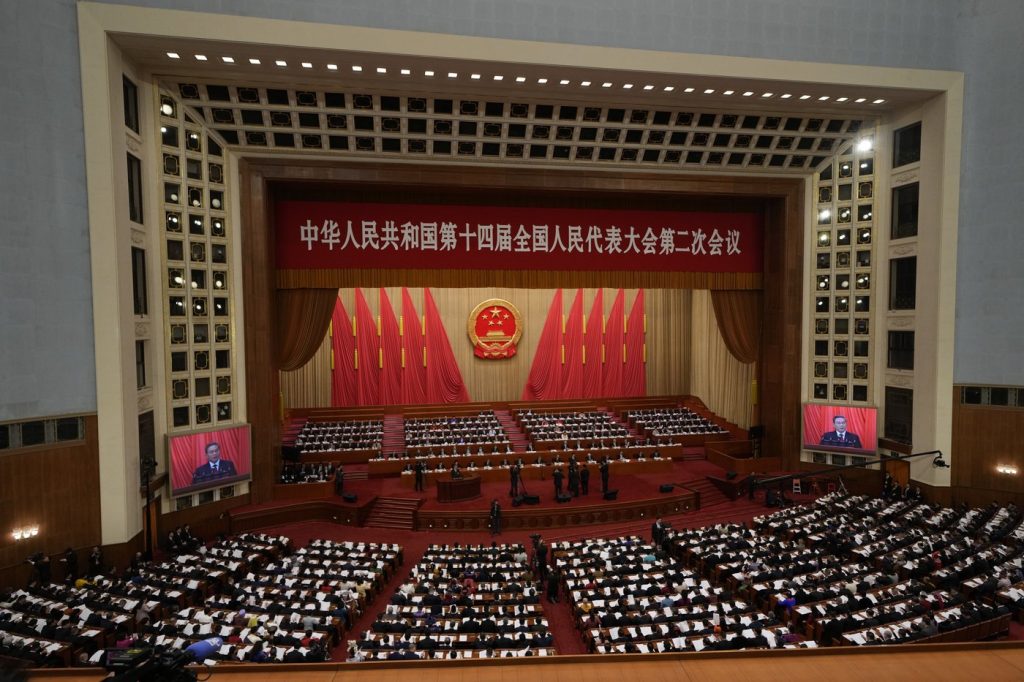BEIJING (AP) - China's annual major political event, the National People's Congress, is set to commence this week, gathering the nation's top leaders and thousands of provincial representatives to ratify decisions made earlier by the Chinese Communist Party. This event is crucial as it not only outlines the government's priorities for the coming year but also disseminates directives to party members and officials nationwide.
The themes emanating from the leadership remain consistent with previous years, focusing on innovation and bolstering domestic consumption. A critical aspect of this year's Congress will be how the government intends to balance these dual objectives and whether such measures will sufficiently revitalize the economy amidst ongoing challenges, including the potential escalation of the U.S.-China trade war.
This year's sessions also signify the conclusion of China’s current five-year economic plan. Analysts and experts will be keen to discern hints regarding the government's strategic focuses for the next plan, spanning from 2026 to 2030.
One of the key highlights of the Congress will be Premier Li Qiang's announcement regarding the nation’s economic growth target for the year. Forecasts by analysts suggest a target around 5%, maintaining the same level as in the previous two years but slightly lower than the 5.5% target set in 2022. Achieving this goal remains challenging for China, which is currently dealing with a sluggish real estate sector and weak consumer spending. Furthermore, amidst heightened trade tensions with the U.S., under President Donald Trump, who recently imposed additional tariffs on Chinese imports, the International Monetary Fund (IMF) has projected a more conservative growth rate of 4.6% for the year.
Another area of focus will be the government’s priorities as discussed in a recent commentary from the official Xinhua News Agency. It indicates a commitment to enhancing domestic demand and fostering innovation in science and technology. Furthermore, there is anticipation of increased governmental support for the private sector to stimulate economic growth. This support has been reinforced by Chinese President Xi Jinping's meetings with prominent business leaders like Alibaba's Jack Ma and Huawei's Ren Zhengfei earlier this year, signaling a high-level endorsement for private enterprises. Additionally, a draft bill aimed at creating a fairer business environment for the private sector is slated for discussion during the Congress.
China has already undertaken numerous measures to bolster its economy, though many have not met expectations for more expansive stimulus packages. Analysts caution against expecting significant policy shifts during the Congress, noting that leaders seem inclined to persist in their focus on innovation aimed at enhancing China’s self-reliance rather than prioritizing consumer-driven economic expansion. Jacob Gunter, an analyst at the Mercator Institute for China Studies, emphasized that the economic framework has shifted away from traditional development goals toward a more geopolitically oriented strategy where technology and industry take precedence over household income improvements.
In terms of foreign policy, Premier Li is anticipated to address diplomatic relations and the situation surrounding Taiwan. However, greater attention will likely be directed at Foreign Minister Wang Yi’s press conference, where he will outline China's stance on U.S.-China relations under the Trump administration. Recent tariff implementations have ignited retaliatory measures from China, including tariffs on U.S. coal, liquefied natural gas, and other commodities. Observers suggest that Beijing's response has been deliberately measured, aiming to convey openness to negotiation while simultaneously demonstrating readiness for escalation if warranted.
Aside from U.S. relations, China’s interactions with Russia and its position on the war in Ukraine will also be closely monitored. At a recent G20 foreign ministers' meeting, Wang Yi remarked on a "window for peace" in Ukraine, hinting at China's support for diplomatic efforts aimed at resolution.
The National People's Congress comprises nearly 3,000 delegates representing a range of interests across China, including provinces, ministries, the People’s Liberation Army, and various social groups. Although the legislature's role is predominantly ceremonial, formalizing decisions made by Communist Party leaders, it provides a valuable glimpse into the central government’s priorities and policy direction. Concurrently, the Chinese People’s Political Consultative Conference also meets, which includes a diverse array of members from various sectors. The dual sessions are collectively referred to as the Two Sessions, serving as significant annual gatherings within China's political calendar.










